By Sean CoughlanBBC News education correspondent
 Makeshift school in Lagos: Nigeria has the most children without schools
Makeshift school in Lagos: Nigeria has the most children without schools
The global figure for the number of children without access to schools has fallen to 57 million, according to the United Nations Educational, Scientific and Cultural Organisation.
But the improvement is unlikely to be enough to meet the millennium pledge for primary education for all by 2015.
These latest figures are for 2011 and are a fall from an estimate of 61 million missing school in 2010.
Unesco's director general Irinia Bokova says: "We are at a critical juncture."
Each year there is a monitoring report from Unesco measuring the world's progress towards the goal of universal primary education - with recent years showing a stagnation after early gains.
But these latest numbers provide a more up-to-date picture, ahead of a United Nations meeting on how to give fresh impetus to efforts to get all children into education.
Continue reading the main story
MOST CHILDREN OUT OF SCHOOL
- Nigeria
- Pakistan
- Ethiopia
- India
- Philippines
- Burkina Faso
- Kenya
- Niger
- Yemen
- Mali
Source: Unesco.
This update also shows that aid for basic education has fallen by 6% and that most of the major donors have cut their funding in the past year. It means that the UK is now ranked by Unesco as the largest direct donor to basic education.
The US had previously been the biggest donor, but it has cut its budget while the UK has continued to increase its spending, leaving the UK as the biggest donor in 2011.
Germany, Australia and Norway have also increased their donations, but there have been budget cuts from France, Japan, the Netherlands, Norway and Canada.
Global pledge
The pledge for universal primary education made by world leaders in 2000 seems increasingly likely to be missed - and there are already discussions about setting new post-2015 targets.
There had been a previous target set in 1990 to achieve this by 2000. When this was missed the goal had been moved forward to 2015.
These latest mid-year figures do show some progress, but part of this is because previous estimates have been revised. The actual progress is about 2 million fewer children missing school, according to Unesco.
More than half of the children missing out on school are now in sub-Saharan Africa. The last annual report showed that in some countries, including Nigeria, the problem is getting worse rather than better.
In contrast, in south and west Asia there have been considerable gains, cutting the numbers of out-of-school children by two thirds in two decades.
Malala's campaign
However the annual comparisons show that in Pakistan there were more children without schools in 2011 than in 2010.
Continue reading the main story
MOST PROGRESS IN GETTING CHILDREN INTO SCHOOL
- India
- Ethiopia
- Pakistan
- Ghana
- Vietnam
- Kenya
- Mozambique
- Morocco
- Niger
- Egypt
Source: Unesco
Malala Yousafzai, a teenage schoolgirl from Pakistan, has become an international campaigner for the right to education, after she had been shot by the Taliban last year.
Pakistan has the second largest number of children without schools - although it has been making substantial improvements, with the third biggest increase in pupils in schools over the past five years.
In terms of annual changes, Ethiopia and Uganda have made the biggest progress in getting pupils into schools.
There are also concerns about making sure that pupils remain in school.
Despite the advances in getting more children to begin school, Unesco says there has not been corresponding progress in pupils staying in school, without about a quarter dropping out before the end of primary school.
There will also be an emphasis on the quality of education and what children learn.
"The world must move beyond helping children enter school to also ensure that they actually learn the basics when they are there," says Unesco chief, Irina Bokova.
"Now is not the time for aid donors to back out. Quite the reverse: to reach these children and our ambition to end the learning crisis, donors must renew their commitments so that no child is left out of school due to lack of resources, as they pledged at the turn of this century."
Gordon Brown, the former UK prime minister and now UN Special Envoy for Global Education, said: "It is clear that by cutting global education aid just at the time when we need to step up our efforts to meet the millennium development goal by 2015, we are missing out the most marginalised - the street children, child labourers, girl brides and disabled children - whose chances of finishing school remain abysmally low."
Mr Brown said that it was not "the time for pessimism or defeatism" and promised that in September he would "set out our plan to get 20 million more children into school".




